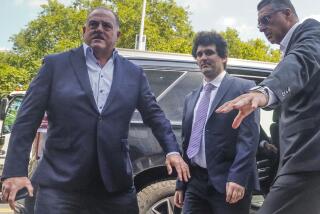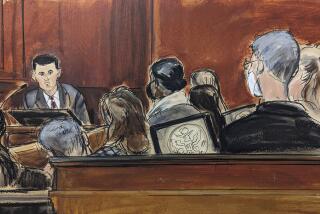Jurors Deliberate in Keating Securities Fraud Trial : Court: Panel is told it may have to spend several days just reviewing 300 exhibits presented in 35 days of testimony.
- Share via
LOS ANGELES — Jurors in the securities fraud trial of Charles H. Keating Jr. began deliberating Monday to decide if he should be found guilty of defrauding small investors who bought his company’s high-yield, high-risk bonds at Lincoln Savings & Loan.
Los Angeles County Superior Court Judge Lance A. Ito took about an hour to instruct the jurors before turning the case over to them. He said jurors might have to spend several days just reviewing nearly 300 exhibits presented during 35 days of testimony since late August.
The state securities fraud case is the first criminal prosecution stemming from the April, 1989, collapse of the Irvine thrift and its Phoenix parent company, American Continental Corp.
Keating, the former chairman of American Continental, is accused of misleading small investors by failing to inform them adequately about the deteriorating condition of his financial empire. He faces a maximum penalty of 10 years in prison and a $250,000 fine if convicted on six of the 18 counts against him.
“I feel good about our case,” said Deputy Dist. Atty. William Hodgman, the lead prosecutor. “I feel a little more anxious about this case than some others because of the notoriety of it.”
The prosecution’s case, built on circumstantial evidence and inferences, relies almost exclusively on Keating’s alleged failure to disclose the financial problems at Lincoln and American Continental.
Keating continued to promote bond sales as safe investments long after everyone else knew the company was “going down the tubes,” Hodgman told jurors in closing arguments last week.
Thousands of bondholders, mainly elderly Lincoln customers, lost more than $250 million after Keating’s empire collapsed. In addition, Lincoln has become the biggest thrift failure to date, costing taxpayers $2.6 billion.
Defense attorney Stephen C. Neal would not comment about the case Monday.
The defense rested without presenting any witnesses.
Neal asserted that the prosecution failed to prove that Keating knew about any misrepresentations, that he intended to aid bond sellers in making misleading statements or that he took actions to aid in defrauding investors.
In questioning by Neal, prosecution witnesses also gave considerable testimony that showed that American Continental staff lawyers and a major New York law firm determined what, how and when to disclose information. Even when Keating wanted to do something different, the lawyers dictated the moves, Neal told jurors.
More to Read
Inside the business of entertainment
The Wide Shot brings you news, analysis and insights on everything from streaming wars to production — and what it all means for the future.
You may occasionally receive promotional content from the Los Angeles Times.










